Wikipedia Hates Women: 4 Dark Sides of The Site We All Use

Wikipedia, for those not familiar, is the largest online encyclopedia. Think Cracked but with slightly fewer fart jokes. Some people want that. Go figure. Despite being such an influential site, Wikipedia has fewer than 10 percent female editors. That leads to some strange problems. For example: The entries on porn stars and Pokemon are both more extensively detailed than the entries on prominent women. This page on American novelists is divided into "Female American Novelists" (for the women-folk) and "American Novelists" (for the men). They once removed all the female movie directors from their list of horror directors.
Basically, it seems like Wikipedia has some weird problems with regard to gender -- so what's up? Well, I was an editor from shortly after it was founded until just a couple of years ago. I am also a trans woman, and I can tell you exactly what's up.
It Started As Something Beautiful

I first joined Wikipedia in 2003, back when the Internet still had stuff like blogs, instead of 23-page slideshows reminiscing about the days when we had blogs. The site had some really embarrassing priorities: While there were dozens of articles about different characters and locations in Atlas Shrugged, there was nothing about Manila. And the article about Nigeria consisted of unmodified copy-and-pastes from The CIA World Factbook 2000. As far as "policy" went, their guiding light was what they called a "neutral point of view" -- the idea is that they would never take a stance on any controversy, ever, and that all the write-ups would be both satisfying and inoffensive to everyone who could ever read them. Sounds kind of ideal, right?
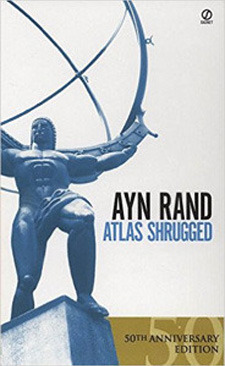
Or at least as evenhanded as you could be while still hosting a shitload of Ayn Rand.
I got into it because I had been researching Cold War Berlin for an online game I was writing, and since Wikipedia was quite sparse on that front, I thought I'd put what I'd found up there. Then, because I also knew a lot about British politics and geography, I created a bunch of articles on that topic. Then I started editing others, because I was having a ton of fun and am clearly a huge dork (see: "was writing an online game about Cold War Berlin.")
I was part of a wave of new editors and an explosion of informative content: Wikipedia went from 19,700 articles at the end of 2001 to 188,800 by the start of 2004, and we just continued growing from there. It became clear that the Wikipedia project was going to produce something incredible. Even if that "something" was just a million-page treatise on Babylon 5.
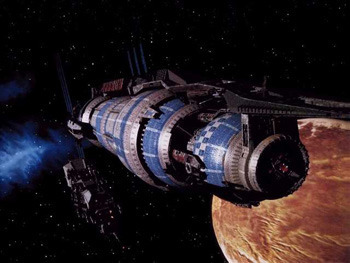
Which sounds funny until you see the actual length.
Then It Got Ugly

As the stakes got bigger, so did the fighting: The first big dispute I got into was the highly contentious subject of British geography. See, some people wanted Wikipedia to use "historic" counties in Britain for everything, leading to such comic absurdities as describing Brixton as being in Surrey (a decade before gentrification, too!). You ... probably don't care about that. But that's why you're not editing for Wikipedia. Still, someday you might have to write a paper on it, and you'll care then.
The point is, we had a small dispute over something that couldn't be less consequential, but the "neutral point of view" doctrine meant that we had to find a compromise that would leave every possible perspective happy. And while the debate seemed courteous enough, this is the point where my user page started to get vandalized. I still don't know who exactly I pissed off or why. Maybe Sir Archibald Pheasantbottom takes his historical British counties seriously. Sometimes it was just silly stuff and charmingly absurd meta-vandalism. Then it got a bit personal.
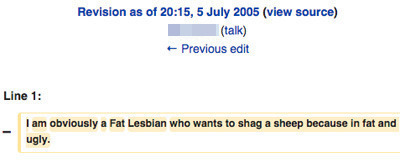
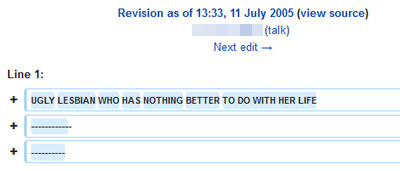
{{Citation needed, you unbelievable assclowns}}
I'm not sure what my gender or sexuality has to do with Brixton, but if you're at all familiar with how the Internet works, you're probably recognizing the pattern: A woman has expressed an opinion and therefore must be destroyed. It wasn't like that before. So what changed? Well, remember how I said we had 188,800 articles at the start of 2004? By 2006, we were at 895,000. The harassment came on the heels of one of the weirdest realizations a group of writers can have: People were starting to care about what we were saying.
We weren't working on the rough draft of an experimental encyclopedia anymore; we were a real source of information. After I created the Wikipedia article for the 7/7 London bombings, I was interviewed by NPR, like a real journalist. But there were downsides, too, like the "Seigenthaler incident," wherein the biography of a living journalist was vandalized to say that he had been involved in assassinating John F. Kennedy. Then the Essjay controversy exposed one of our most prominent editors, supposedly a professor of theology, as a fraud. These weren't weird mistakes or jokes anymore -- the words we wrote were actually impacting people's lives, and the whole world.
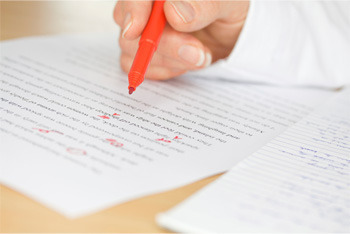
Especially the blood pressure of teachers reading their students' "original" papers.
Which was great news -- but as more and more people started listening to us, some men in our ranks started doing everything they could to make sure that the women weren't heard.
The Hostility Spread Everywhere, Even To "Harmless" Pages

In 2006, someone I knew was questioned by police after somebody claimed that his short stories were murder threats. That may seem like small potatoes in today's world of "swatting" folks over video games, but it was a dangerous escalation at the time. I was out as trans on the site, but not at work, and I preferred to exercise control over that particular biographical nugget. So I decided to keep my head down and focus on articles about entertainment, hoping that stuff would prove less controversial. In retrospect, this seems comically naive, but what can I say? It was the mid 2000s. We were all babes, lost in the terrifying woods of the Internet.
At least the Spartans gave their kids a damn spear.
I ended up working on Star Trek articles because they were really "fancrufty" -- that is, written by fans, for fans, full of impenetrable jargon and obscure references. So I bought a bunch of Star Trek books and started to go through, politely but firmly making sure we had the best bloody series of Star Trek articles on the Internet. That's a little like making sure you make the best porn on the Internet -- it's a serious, nigh-insurmountable task.
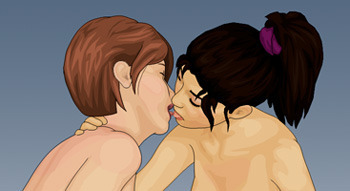
... And one which we totally accomplished, thankyouverymuch.
Almost immediately, some of my fellow editors became actively hostile. One particular editor proudly proclaimed that he couldn't provide sources for a lot of his research because he was deployed overseas and didn't have access to his books. When I pointed out that I did have the books and they disagreed with him, he replied:
"I would be careful telling a deployed member of the military they shouldn't edit on Wikipedia for whatever reason."
After that threat and him supposedly "letting his friend use his account" to post abusive messages about me, he had his admin privileges removed. Later, he (or maybe someone pretending to be him, or someone using his account) told everybody that I had faked a rape report about him.

Of course, I wasn't the only woman dealing with this shit, and eventually the toxic environment started ripping Wikipedia apart from the inside. Over the next five years, the number of Wikipedia editors shrank by over a third, with most of those that left being women. An independent investigation of Wikipedia's methodology found that the overly complex, ossified rules made it impossible for new blood to enter the fold: New editors were a quarter as likely to stay in 2010 as they were in 2003. That's a worse turnover rate than whichever position has to clean up bodily fluids at Walmart.
Wikipedia Did Not Deal With The Whole Trans Thing Very Well

One Thursday in August, Chelsea Manning came out as trans and asked everyone to start using her new name and pronouns. I noticed nobody had moved the page yet. I checked my sources, I checked that the "identity" section in the manual of style was still valid, and I moved the article. It got moved back almost immediately because someone hadn't seen the news and thought I was a vandal. Fair enough. I moved it back, and it then became an enormous fight, with all sorts of trans-hostile questioning going on on the talk page, and the process for dealing with contested article moves was activated.
The next day, I did an interview with The New Statesman, and within days was bombarded with emails complaining that I had deceived the interviewer by not mentioning I was trans and demanding that I out myself as trans on my Wikipedia user page. Somebody defaced my user page that night to say "My name is , and I've always been a fantasist. Nowadays, I call myself Abigail." He said that he did not regard this as an outing attempt: "You're a Wikipedia administrator, right, with delete buttons and all? If I'd meant it to stick, there are lots of other sites on the web."

I've got a suggestion for a place you can stick that thing.
The Arbitration Committee (or "ArbCom") washed its hands of the core issue, tacitly supporting that Chelsea Manning's page stay "Bradley." Around that time, a friend and cisgendered editor was told he was "too involved" to use admin powers on articles about trans people -- he was never given a reason, but it seemed like the problem was that he knew trans people (me), so clearly he couldn't be objective about any trans people anymore. Presumably anybody that knows a man is forbidden from editing pages on other men, since they're so clearly biased.
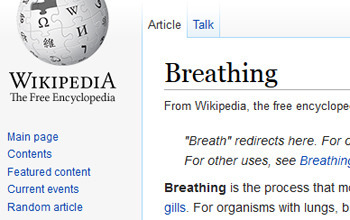
I assume this is just a placeholder until a breath-neutral editor can come along and clear up the bias.
That's when I left, and as of today I haven't considered going back. I love research. I love editing. I love being a part of big Internet projects like these. But I hate having to fight against threats and harassment just to be heard. They made it twice as hard for me as it should have been, and it just stopped being worth it. That's the story.
Quick, somebody make the relevant updates on the "Notable Internet Assholes" page.
Have a story to share with Cracked? Email us here.
For more insider perspectives, check out 6 Awful Lessons I Learned Transitioning From Female To Male. And also check out 5 Ways Modern Men Are Trained To Hate Women.
Subscribe to our YouTube channel to see more ways the world has gone rampant with sexism in 5 Bizarrely Specific Sexist Stereotypes in Modern Ads, as well as watch other videos you won't see on the site!
Also follow us on Facebook because there's more people raging out on social media than there are in the comments section.
